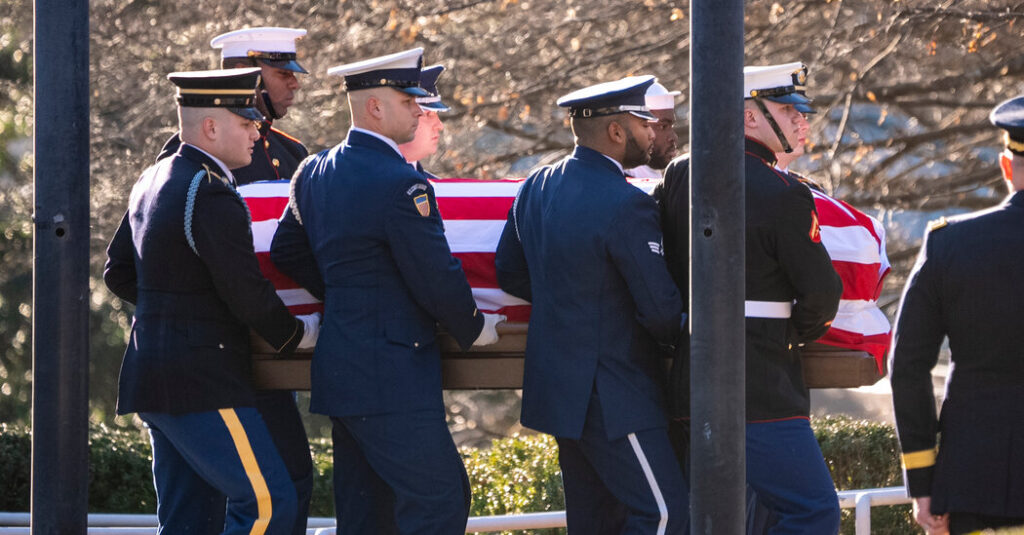Former President Jimmy Carter, who disavowed the trappings of the imperial presidency and never gave up his humble Georgia roots, will nonetheless be given an elaborate national send-off starting on Tuesday when he is brought to Washington for three days of tributes.
Mr. Carter, who died last week at age 100, will be flown from Atlanta to Washington and taken to the U.S. Navy Memorial downtown before being delivered to the U.S. Capitol by a horse-drawn caisson. In the Rotunda of the Capitol, he will lie in state for a day and a half before a formal state funeral at Washington National Cathedral on Thursday.
Vice President Kamala Harris; House Speaker Mike Johnson, Republican of Louisiana, and Senator John Thune, the Republican majority leader from South Dakota, will deliver eulogies and lay wreaths at the Capitol during a ceremony set to begin around 4:30 p.m. Tuesday. Among the dignitaries invited are members of Congress, the cabinet, the Supreme Court, the Joint Chiefs of Staff, the diplomatic corps, state governors and the mayor of Washington.
The schedule was pushed back because of snow in Washington, but the public will still be able to pay respects from 7 p.m. to midnight Tuesday and again all day Wednesday. Thousands are expected to make their way to the Capitol to honor the 39th president, who served from 1977 to 1981 and will be placed on the same catafalque that bore Abraham Lincoln after his assassination in 1865.
According to the official schedule, “Ruffles and Flourishes” and “Hail to the Chief” will be played at least five times on Tuesday: at the Carter Center in Atlanta, where he will start the day; at Dobbins Air Reserve Base in Georgia, where he will be loaded onto a special presidential jet for the flight north; at Joint Base Andrews in Maryland, just outside Washington; at the Navy Memorial; and again at the Capitol.
At three of the stops — Dobbins, Andrews and the Capitol — a 21-gun salute will be fired in his honor. A series of honor guards and military bands will participate in the various events. The stop at the Navy Memorial is meant to take note of his service in the Navy as a submariner.
All of the pomp and circumstance are traditional for a presidential memorial, in keeping with the farewells to Presidents George H.W. Bush in 2018, Gerald R. Ford in 2006 and Ronald Reagan in 2004. But they are still striking in the case of Mr. Carter, who was so eager to play down the grandeur of the office that he initially banned the playing of “Hail to the Chief” when he was president.
Coming to office after Watergate and Vietnam, Mr. Carter wanted to demonstrate humility to restore faith in government and presented himself as a man of the people. On his Inauguration Day, he surprised the crowds by jumping out of his presidential limousine with his wife, Rosalynn Carter, to walk the parade route to the White House, setting the tone for his tenure.
In addition to banning the welcome trumpets favored by President Richard M. Nixon and others who lived in the White House, Mr. Carter sold the Sequoia, the presidential yacht, and insisted on carrying his own luggage onto Air Force One when he traveled. He barred senior members of his staff from using a White House car service to and from work and turned the thermostat of the White House down to 65 degrees in his first winter living there to save energy.
Eventually, after coming under criticism for diminishing the stature of the office, Mr. Carter relented on some of these measures, coming to realize that Americans wanted the presidency imbued with a certain majesty. He allowed “Hail to the Chief” to be played again, at least under limited circumstances, although he never bought another presidential yacht.
Mr. Carter came by his humility honestly. Even after he was defeated for re-election, he and Mrs. Carter returned to the simple ranch house that they built in 1961 in Plains, Ga., and lived out the remaining four decades of their lives there. The four-bedroom, three-bath house is valued at $241,000 by Zillow.
While other former presidents have cashed in with six- and even seven-figure checks for speeches, cushy corporate gigs and other multimillion-dollar moneymaking ventures, Mr. Carter earned a living in large part by writing books — 32 in all — and never lived the high life that his presidential peers have.
But at some point along the way, he clearly gave in to the demands of tradition and agreed to the sort of elaborate memorial events generally associated with a head of state. Presidents are deeply involved in the planning of their funerals — in Mr. Carter’s case, he was part of the discussions for decades. He did draw the line at one idea originally in the plans. He refused to let his remains be transported back to Georgia for burial by train. Instead, he will be flown.
Here is a schedule of Tuesday’s events:
-
11 a.m. — Departure ceremony at the Carter Center in Atlanta.
-
12:45 p.m. — Flight aboard Special Air Mission 39 from Dobbins to Andrews.
-
2:15 p.m. — Arrival at Andrews for motorcade ride into Washington.
-
3:30 p.m. — Transfer ceremony at the U.S. Navy Memorial.
-
4:10 p.m. — Horse-drawn caisson arrival at the Capitol.
-
4:30 p.m. — Ceremony in the Rotunda featuring eulogies by Ms. Harris, Mr. Johnson and Mr. Thune.
-
7 p.m. — Public invited to pay respects.


